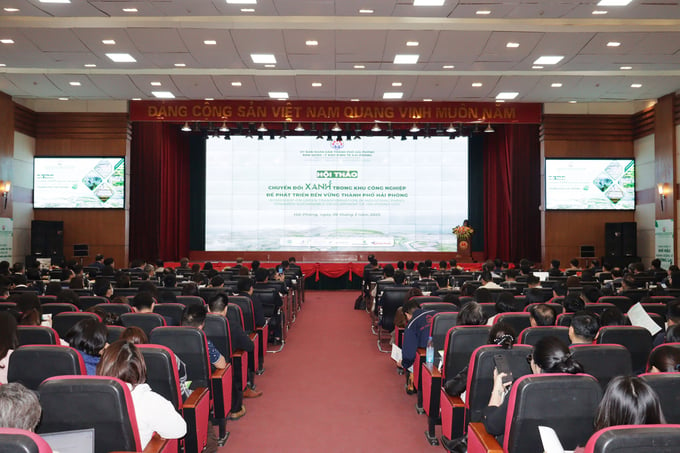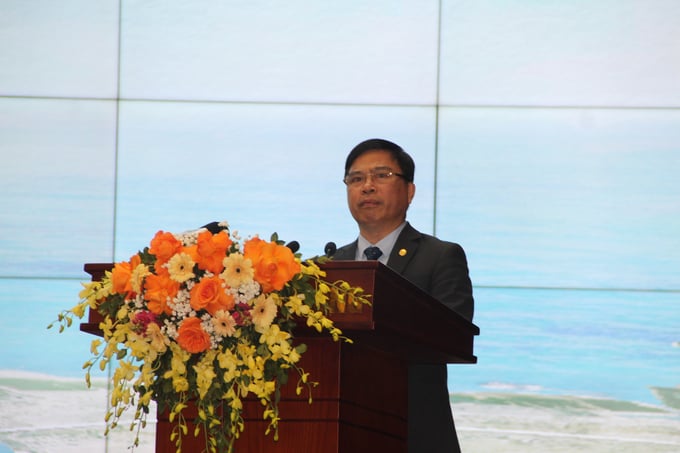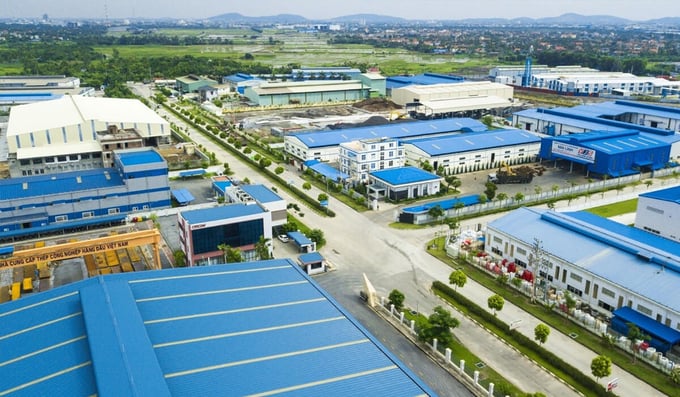December 31, 2025 | 13:57 GMT +7
December 31, 2025 | 13:57 GMT +7
Hotline: 0913.378.918
December 31, 2025 | 13:57 GMT +7
Hotline: 0913.378.918

The workshop “Green Transformation in Industrial Zones for Sustainable Development of Hai Phong city” is an important event to share experiences and propose solutions for green transformation, contributing to sustainable development. Photo: Hoang Tung.
On March 6, Hai Phong Economic Zone Authority organized a workshop with the theme of “'Green transformation in industrial zones for sustainable development of Hai Phong city”. There were 400 delegates attending the workshop, including leaders of central agencies, embassies, international organizations, and experts and businesses.
Experts and leaders of domestic and international organizations and businesses discussed many engaging topics such as eco-industrial parks, circular economy, industrial symbiosis, greenhouse gas emission reduction, carbon tracing, ESG standards, green port development, and green credit. Many contents were suggested in order to effectively implement green transformation and digital transformation in industrial parks and economic zones of Hai Phong city in the near future.
“As a leading economic, industrial and seaport center of Vietnam, Hai Phong city is always aware of its role and responsibility in environmental protection and climate change response. Hai Phong is proud to be one of the leading localities in building and implementing action plans on green growth, showing a strong commitment to sustainable development,” said Do Manh Hien, Permanent Deputy Secretary of Hai Phong City Party Committee.
Hai Phong city’s consistent stance is not to trade the environment for a simple gain in economic growth. Hai Phong aims to develop economic development associated with environmental protection, ensuring the harmony between economic interests and social interests for the sustainable development of the city and future generations. In order to realize this direction, the City Party Executive Committee will issue a resolution on green transformation in the first quarter of 2025, as a basis for all levels, branches and localities to implement in a synchronous and effective manner.

Duong Dinh On, Director of Hai Phong Department of Agriculture and Environment presented his opinions at the workshop. Photo: Hoang Phong.
Presenting his point of view on the action plan of Hai Phong city aimed at "Net Zero" in 2050, Duong Dinh On, Director of Hai Phong Department of Agriculture and Environment said that the planning of the 2021 - 2030 period oriented Hai Phong to become a modern marine economic center, focusing on seaport service, logistics, marine tourism along with education and scientific research. The city would also face environmental challenges and impacts of climate change, which is listed by the OECD as one of the ten most threatened cities in the world in the next 10 years.
Regarding the commitment to reducing greenhouse gas emissions towards net zero emissions on a national scale, Hai Phong issued Plan No. 222 on September 15, 2022, setting the goal of reducing at least 43.5% of greenhouse gases in 2030 and achieving net zero emissions in 2050. The plan included specific operations such as the development of green human resources, financial mobilization for green growth and green infrastructure.
Hai Phong has achieved considerable results from 2022 to 2025 such as recovering 150 ha of mangroves, supporting businesses in the application of energy-saving technology and carrying out greenhouse gas inventory at 107 establishments. The city also studied the carbon neutralization script by 2050 with 34 specific projects. Despite experiencing difficulties in terms of resources, Hai Phong continues to develop low carbon scenarios and an emission reduction plan for Cat Hai island district.

Green transformation in industrial zones is a global development trend. Photo: NCK.
In recent years, Hai Phong has implemented early adaptation measures for climate change and reducing greenhouse gas emissions, according to the provisions of Vietnamese law. Relevant specialized agencies have proposed pilot carbon credit exchanges to develop the local carbon market.
“Green economy and cỉcular economy are not only popular concepts but also an indispensable development trend of global stature. In response to that trend, industrial parks in Hai Phong city were at the forefront of green transformation activities,” said Le Trung Kien, Head of Hai Phong Economic Zone Authority.
Many businesses in Hai Phong's industrial parks are actively transforming toward green growth by using renewable energy and recycled materials, aiming towards ESG goals. This shows responsibility to the community and society in general. Reducing the negative impact on the environment is also a lever to improve competitive advantage and build a sustainable brand.
Translated by Samuel Pham
/2025/12/25/2157-2-170845_745.jpg)
(VAN) Amid the impacts of climate change and market competition, An Giang's agriculture is shifting toward a green, modern growth model, creating a key driving force for restructuring the sector.

(VAN) Two leading enterprises in the agricultural sector have officially cooperated to implement a sustainable value chain model for Viet Nam's shrimp industry.

(VAN) Dien Bien is speeding up ODA projects to respond to climate change and strengthen water management and disaster prevention infrastructure in pursuit of sustainable development.

(VAN) With high automation, large capacity, and a green development orientation, the Hai Duong Plant Branch is becoming an important anchor for the animal feed market.
/2025/12/01/2936-2-222331_70.jpg)
(VAN) Mortgaging his house and giving up a pharmaceutical management career, Mr. Nguyen Quang Duy succeeded in bringing Khanh Hoa's sea grapes to demanding markets such as Japan and the U.S.

(VAN) The large-scale agroforestry investment project aims to develop a leading sustainable agro-industrial center in Angola.
/2025/11/28/3433-1-212821_213.jpg)
(VAN) Many localities across the coconut land of Vinh Long are replicating emission-reducing models in production and daily life, contributing to the targets for emission reduction and green economic development.